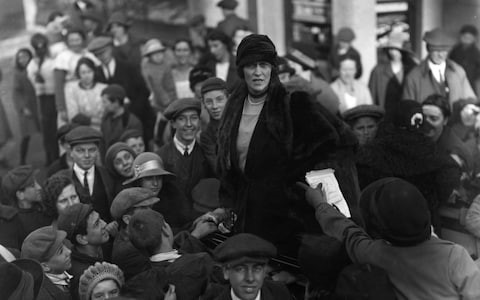A Political Pioneer
American-born Nancy Astor (1879–1964), née Langhorne, succeeded her husband Waldorf Astor as Conservative MP for Plymouth Sutton in 1919, becoming the first woman to sit in the House of Commons. She continued to represent the Plymouth Sutton constituency until her retirement in 1945.
Challenging the male narrative in Parliament
The election of Nancy Astor as MP for Plymouth Sutton changed British democracy forever. For the first time, a woman was able to directly influence the parliamentary debate and the writing of the laws of her own land – a responsibility she willingly shouldered for all women. Her courage and resilience in standing alone for almost two years in a hostile House of Commons established a platform on which women continue to build today. Her arrival in Parliament ushered in a new type of politician, a public woman, a new perspective and a reminder that there were female voters who increasingly demanded to be satisfied.

A Historical Figure
As historians, it is inevitable that we look to the past to find echoes of the challenges and achievements that we still see today. While the lines of continuity with the past are not always crystal clear they are there, our present and the future are inevitably shaped by the past and those who inhabited it. There are those pathfinders whose contribution demands recognition and whose paths begin with first steps we can trace in today’s continuing demand for a better balanced world and in this light, Nancy Astor, both as an individual and her legacy, are important. Being the first is never easy and as people they rarely sit comfortably on the pedestals that we force them on to. As Nancy herself said, ‘Pioneers may be picturesque figures but they are often rather lonely ones’.
The 1920’s heralded the end of a 60 years fight for the women’s vote, but in 1919 it fell to Nancy Astor to be the first woman to take her seat in parliament. She sat alone in the house of Commons for almost two years but she determinedly demonstrated that women were physically as well as intellectually capable of rising to the challenge of being an MP. She coped with a constant and insidious sexism that undermined her attempts to be taken seriously. She avoided comments on her clothing, by adopting a uniform of a dark coat and skirt, white blouse and tricorn hat which set the style for her female colleagues in years to come. Just 3 months after her election, on 24th February she stood alone amongst an audience of over 500, mainly hostile, male MPs and delivered her maiden speech on the unpopular question of restrictions on “Drink”. Nancy’s bill, Intoxicating Liquor (Sale to persons under 18) Act, was passed 3 years later ( the first ever introduced by a woman), and remains the reason why we all have to wait until we are 18 to drink today.
Nancy was constantly aware that she was representing her sex as well as her constituency, and claimed ‘to speak for hundreds of women and children throughout the country who cannot speak for themselves’.

She was a pioneer of women in the professions lending her support to legislation surrounding women in the workplace and the safety of women when out on the streets. She also campaigned for nursery school provision, school nurses, and women’s access to the professions, especially the women police and she had a passionate commitment to the equal franchise. Women could not vote on the same terms as men until 1928 but Nancy made sure that the Conservative Party kept their promises.
These comments are in made within the context of Astor’s anti-Catholic and anti-Semitic statements. More information on these subjects can be found here.
